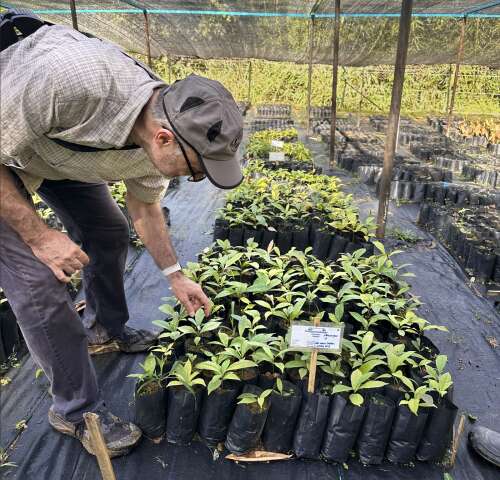A year after the Morton Arboretum and the Shedd Aquarium became two of just 18 global Centers for Species Survival, the two budding Chicagoland institutions have traveled the world conducting conservation and research efforts.
Designated by the International Union for Conservation of Nature and partly funded by a private family foundation based in Skokie, the Shedd Aquarium became the first dedicated Center for Species Survival: Freshwater and the Morton Arboretum the first Center for Species Survival: Trees last March. The centers were tasked with conserving trees and freshwater ecosystems while raising awareness of their mission to prevent irreversible species extinction.
“Having two Centers for Species Survival here has raised Chicago’s international profile as an ecosystem preservation hub,” Silvia Alvarez-Clare, the Arboretum’s director of global tree conservation, said in a news release. “Earth Day provides the opportunity to highlight our work with local partners to safeguard biodiversity — in some of the most ecologically threatened areas of the world for current and future generations.”
The Arboretum’s first year as a Center for Species Survival included 250 herbarium specimens collected for research in Mexico, 20 new individuals of a critically endangered tree discovered in the state of Baja California Sur, and the start of restoration work to tropical cloud forest ecosystems in Guatemala.
And this March, the center’s work brought eight Chicago-area teachers to Costa Rica to learn from local experts and community members about the challenges of conserving tropical ecosystems.
The sixth through 12th grade teachers from Chicago, Naperville and Wheaton are using the experience to develop classroom activities and resources that connect their students to tree conservation efforts.
“Education is a fundamental component of our work,” Alvarez-Clare said. “By supporting local educators to create innovative and experience-based curricula, we hope to reach hundreds of students to inspire their continued learning about the natural world and become advocates for biodiversity conservation.”
For the Shedd’s center, the last year has taken researchers on expeditions throughout Central America to uncover and understand freshwater mussels. The understudied animals, critical to the health of underwater ecosystems due to their incredible filtering capabilities, are among the most imperiled group of organisms in the world.
In an effort to alleviate the dearth of available data on the animals, the Shedd’s team explored 32 survey sites in Costa Rica and 11 sites in El Salvador this year, uncovering a total of eight different species.
“By expanding research efforts and collaboration, we aim to create ripple effects that will ultimately help safeguard precious freshwater ecosystems and species at risk,” Yasmín Quintana, the Shedd center’s manager, said in the release. “The verification of specimens, the field training and curatorial assistance provided by our freshwater mussel expert Dr. Kentaro Inoue are helping develop a foundation of freshwater scientists through meaningful partnerships in the region.”
• Jenny Whidden, jwhidden@dailyherald.com, is a climate change and environment writer working with the Daily Herald through a partnership with Report For America supported by The Nature Conservancy. To help support her work with a tax-deductible donation, see dailyherald.com/rfa.
Malaysia is a key study area for the Morton Arboretum’s center.
Courtesy of Morton Arboretum
In Costa Rica and Guatemala, the Arboretum’s team is working with local partners to restore the tropical cloud forest’s ecosystem through integrated conservation efforts with communities and protected-area managers.
Courtesy of Morton Arboretum
Shedd Aquarium researchers in Costa Rica in muddy, crocodile-filled waters to uncover, understand and identify Central American freshwater mussels.
Courtesy of Shedd Aquarium/Chuck Knapp
Shedd Aquarium researchers in Costa Rica in muddy, crocodile-filled waters to uncover, understand and identify Central American freshwater mussels.
Courtesy of Shedd Aquarium/Chuck Knapp
